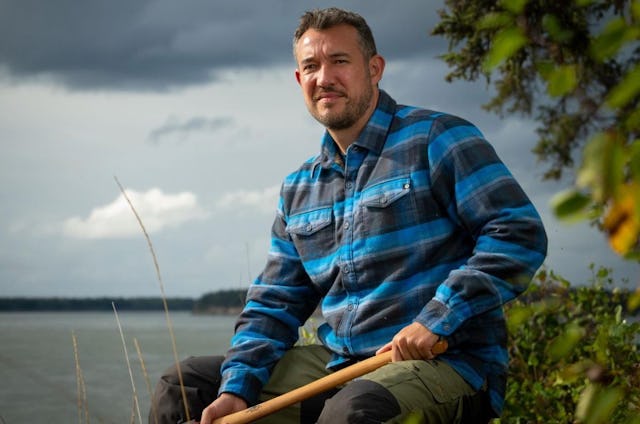'Alone UK' Winner Thinks All Parents Should Leave Their Kids On A Desert Island
I’m listening...

Have you ever read parenting advice that sounds good, but it also sounds like a ton of work? Like attachment parenting looks very snuggly, but just feels a little 24/7, or authoritative parenting seems like it makes sense, but it feels like you don’t get much time to kick back and relax?
Well, here’s a new parenting concept brought to you by Tom Williams, the recent winner of the United Kingdom’s version of Alone, the runaway popular reality TV show that dumps a group of contestants in the wilderness and waits to see who can last the longest without calling for help: He wants us all to leave our kids alone on a desert island.
Yes, you heard that right.
No, you can’t start packing their things just yet.
No, you cannot just start calling yourself a “desert island mom” and go to the spa.
Yes, this concept starts making a little more sense when he explains it.
“We have too much comfort and no jeopardy in our lives. Our lives are easier and easier and easier, and depression, anxiety, and ill health are skyrocketing. Clearly, we're not necessarily living better lives as a consequence of the comforts, and we need that adversity and challenge to stay sharper and to be healthier,” he told the Longview News-Journal. “Children need coming-of-age experiences, and they need that adversity to build up that resilience.”
Okay. I’m convinced. I’m going to put a poncho on my kid, give them a flint, and send them into the woods.
Williams talked about the skills and the mindset he needed in order to win the survival show: he spent 34 days solo in the middle-of-nowhere Canada, eating mice and building a shelter with minimal resources.
First off, he needed a totally positive and optimistic attitude, and you’ve got to dump negative self-talk, too.
"There is only one companion in your brain, and you must pay attention to how they talk to you,” he said in the interview. “You've got to ensure that your inner voice is your best friend, and they're picking you up. You won't go far, calling yourself an idiot and being unconscious of yourself out there.”
This is actually advice I need to survive every day of single parenthood, too.
You also have to see opportunity instead of fear, he adds.
“When I arrived, the helicopter left. I was looking at my land, and instead of a green wall of trees, I thought this was a kind place that would support me. I felt like I had everything I needed here,” he said of his outlook.
All of these thoughts led him to create Desert Island Survival, a company that will literally strand you alone on an uninhabited island with only your thoughts, and you pay them for the privilege. Sure, they also teach survival skills for the first leg of your trip, but the latter part of the package involves three days of solitary time, too.
He’s already taken his 6-year-old son Edward to a deserted island for three days — they only had food, water, and a couple of hammocks. And no screens. Talk about surviving in the harshest conditions.
It revealed another benefit to desert island living: you get to work on mindfulness and presence.
“I also noticed how much more present I was as a father,” he said of the adventure with his son. “Obviously, without having the option of a screen, we connected deeper. I enjoyed teaching him things like reviving the fire from the embers. It made me more mindful that when we spend time out in nature with the children, we get more on their level. We are more present and a better parent.”
While it’s very fun to joke about abandoning all of our children alone on an island because it’s good for them, Williams is definitely making some very sensible points about raising strong, healthy kids — as well as how to be a top-notch parent. It sounds simple, but it’s true: staying positive, looking for opportunities, and giving in to the present moment are all central keys to life. And they’re skills we can work on with our families every day, and not just alone on tropical islands, even if that sounds sort of nice.